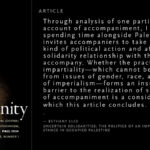Protective accompaniment is a non-violent intervention strategy used by international civil society organisations working in the occupied Palestinian territories. This article explores one accompaniment organisation’s discourse and practice of human rights based impartiality. Firstly, the universalising rhetoric of human rights is shown to be a strategic device which acts to obscure the specifics of a mission to protect Palestinian subjects. Secondly, examining accompaniment as praxis in the West Bank, a ‘non-partisan’ stance is shown to result in an embodied and ideological withdrawal from those being Continue reading → Continue reading →
This article extends recent academic debates about the sociohistorical entanglements between neoliberalism and human rights by exploring transitional justice processes in Sierra Leone, which followed the country’s decade-long civil war (1991-2002). It analyses the ways both the Special Court for Sierra Leone (SCSL) and the Sierra Leone Truth and Reconciliation Commission (SLTRC) drew on ‘economic’ discourses, variously using the concepts of ‘greed’, ‘corruption’ and ‘governance’ to explain the broader context of the human rights violations with which they were concerned. By critically tracing how these Continue reading → Continue reading →
This article offers a history of drones grounded in the British use of aerial control in the Middle East and Afghanistan before World War II, rather than in the history of technology. Such a history promises a better understanding of the drone strategy’s likelihood of success because it shows how history, memory, and politics have shaped both the use of aerial control and its reception. Specific cultural and political assumptions first underwrote the invention of aerial control in the Middle East and continue to guide the use of drones in the region today. Our focus on remote piloting as the most controversial aspect of drone use has distracted us from these critical continuities with earlier uses of air power. Continue reading →


